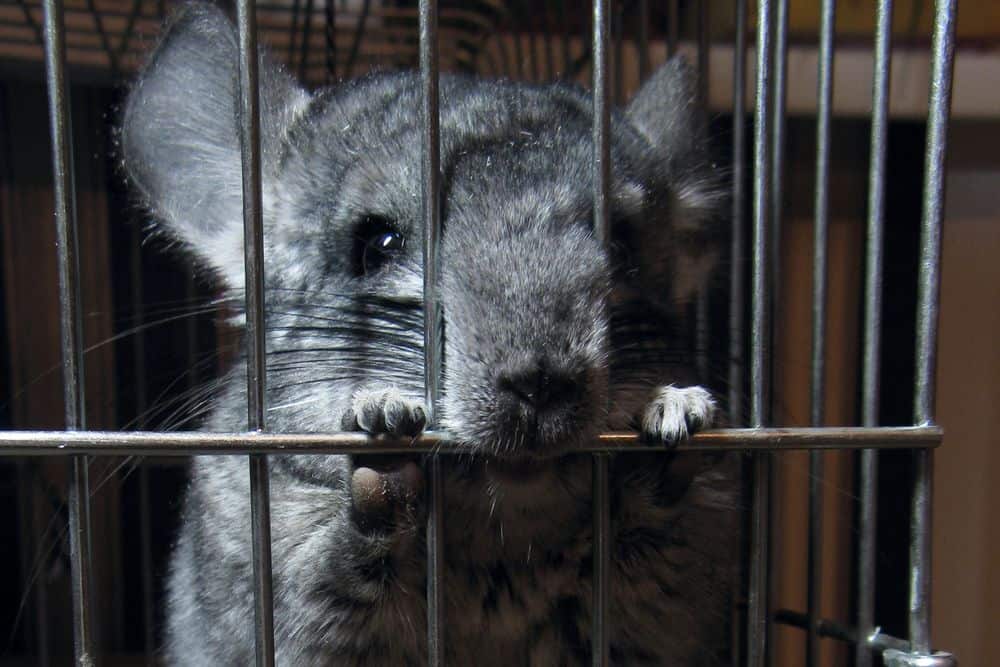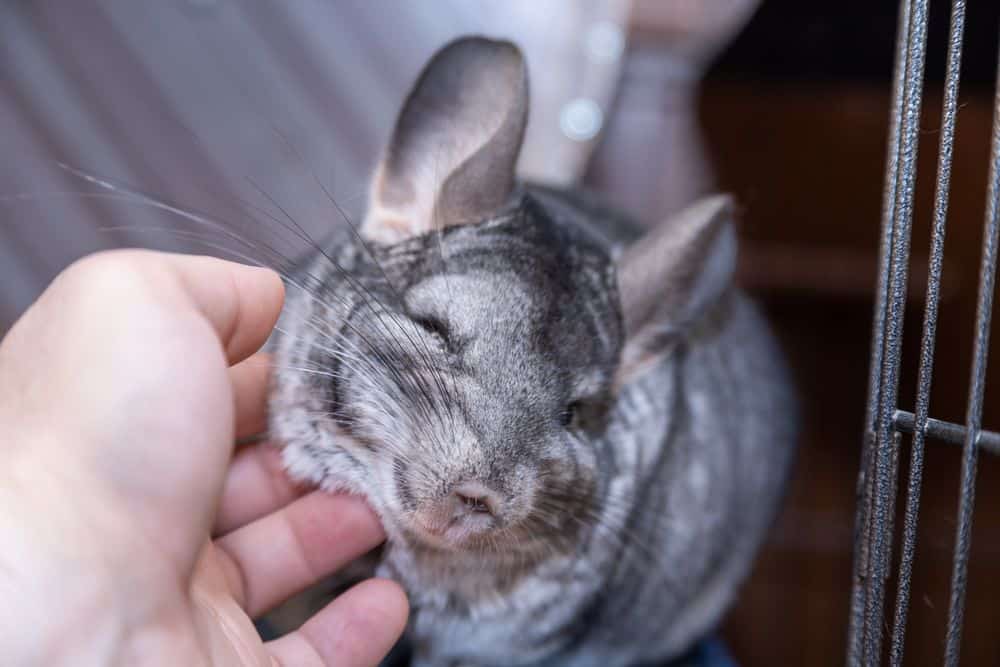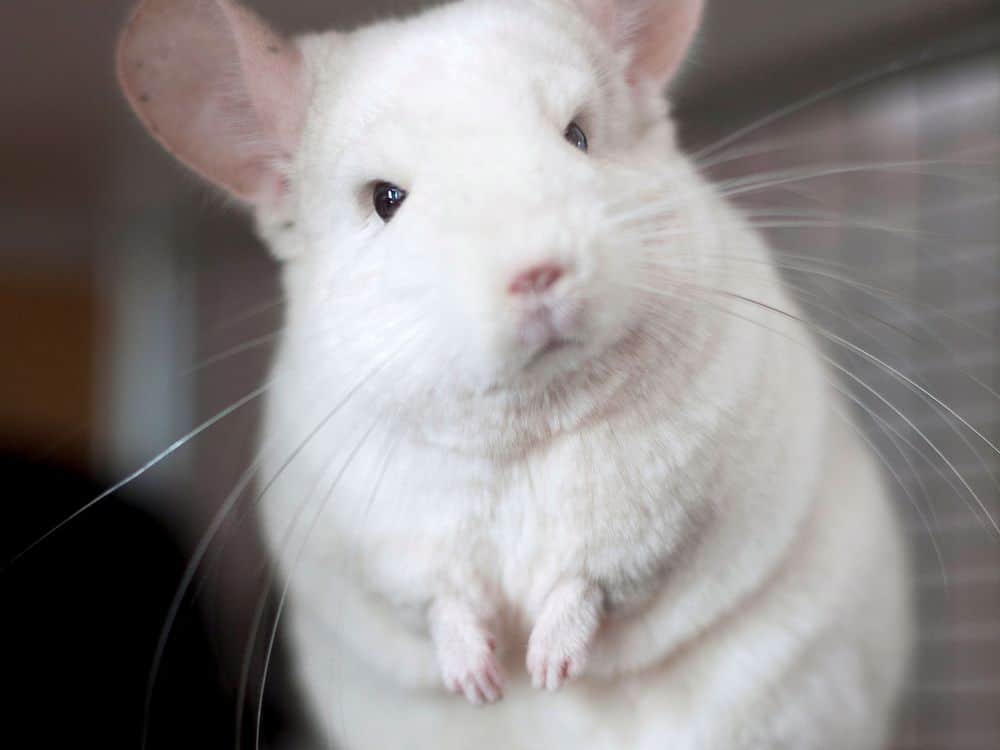
They live in large groups in the wild and are constantly interacting with other chinchillas.
That’s why it may seem strange that many owners report their chinchillas exhibiting territorial behavior.
Are chinchillas territorial, or are those simply exceptions to the rule?
It turns out, their behavior can change a lot in captivity. Not surprising, I guess.
If we lived in a cage and were separated from our kind, we’d behave much differently, too.
Keep reading to learn why some chinchillas become territorial in captivity and what you can do about it.
Contents
Are Chinchillas Territorial?
Yes, chinchillas have a tendency to become territorial in captivity. This may seem counterintuitive for such a social animal that lives in large groups in the wild, but things change when you put them in a cage.
We’ll take a look at why many chinchillas suddenly become territorial when in captivity and how that manifests itself. We’ll also briefly discuss how to introduce two chinchillas, if they will be living together.
Why A Chinchilla Can Become Territorial

Chinchillas are naturally social animals, because they evolved to live in large groups for protection in their native habitat in the Andes Mountains. However, in captivity, their behavior can change. They may become more aggressive in defending their territory.
Chinchillas that are not accustomed to being around other chinchillas or sharing their space may become territorial. They may display aggressive behavior towards other chinchillas when sharing a cage.
Introducing Chinchillas
You may already have one chinchilla and would love to get another one, so that your current chinchilla has some company. Because of their tendency to become territorial in captivity, you can’t simply put the second chinchilla in the cage with the first one.
You need to introduce them gradually and gently and let them form a bond with each other. When introducing chinchillas, whether for breeding purposes or socialization, it is important to monitor all interactions.
Begin by putting in in a separate cage and placing the cages next to each other. Begin with short meetings and gradually let them get longer. Once they seem to have gotten used to each other, you can try putting them together in one cage. It is best to use a neutral location, so neither has “home cage advantage”.
If the chinchillas seem to be stressed or unhappy, separate them and try again another day. Once they are ready to occupy the same cage, it is a good idea to provide each chinchilla with individual space and resources, such as nest boxes, food and water bottles, etc. This can help alleviate territorial behavior.
It is also worth noting that female chinchillas are generally more territorial than males. This is because in the wild female chinchillas are the core of the herd, but male chinchillas can switch to any herd they like.
How Do Chinchillas Mark Their Territory?
Chinchillas have scent glands on their cheeks, chins, and bellies. These glands produce sebum, a greasy substance that they use for various purposes. One of these purposes is marking their territory.

Chinchillas typically use their chins and cheeks to rub against surfaces or other chinchillas, leaving behind traces of their scent. This action not only helps them establish their boundaries but also leaves a trail for other chinchillas in the colony to follow.
Chinchillas mainly mark their territories using urine. They usually choose one or two areas within their enclosure where they’ll urinate. Once they’ve marked their spot, they’ll continue to do so every time they need to pee.
Chinchilla urine has a slightly sweet odor that’s unique to each chinchilla. Therefore, they use it to identify and communicate with other chinchillas.
Chinchillas also use feces to mark their territories. Chinchilla poop is typically dry, round, and pellet-like, making it easy for them to stack it in noticeable piles.
They’ll typically choose spots near the entrance of their enclosure, close to their food dishes or sleeping areas. By doing so, they alert other chinchillas in the area that this is their territory and that they’re not afraid to defend it.
Are Chinchillas Territorial With Their Owners?
Chinchillas are social creatures and generally do well with human interaction. They are playful and fun-loving and enjoy spending time with their owners. However, chinchillas can be territorial if they feel threatened or uncomfortable. If your chinchilla is feeling defensive, it may display signs of aggression, hissing, or barking.

Over time, your chinchilla will most likely become used to having you in its presence, since you have to top up its water bottles food every day, and also clean the cage. This means putting your hands into your pet’s personal space.
Your chinchilla is a smart animal and will soon learn that you are putting your hand in its cage to help it out, especially when you give it food. It won’t be long until it becomes excited to see you!
Chinchillas Are Territorial: Final Thoughts
Every chinchilla is different, but many do exhibit territorial behavior in captivity. As expected, this behavior is more prevalent in chinchillas that have not had any opportunities to socialize with their own kind.
If you have a a territorial chinchilla and want to bond it with another to give it a friend or breeding partner, the most important thing to remember is to give it time. Introduce them gradually and let them get used to each other at their own pace.
Leave a Reply